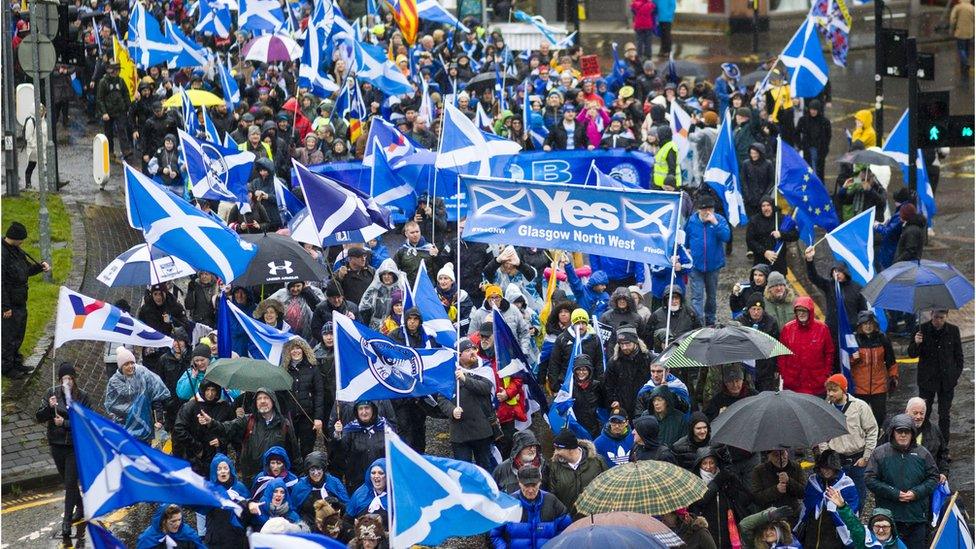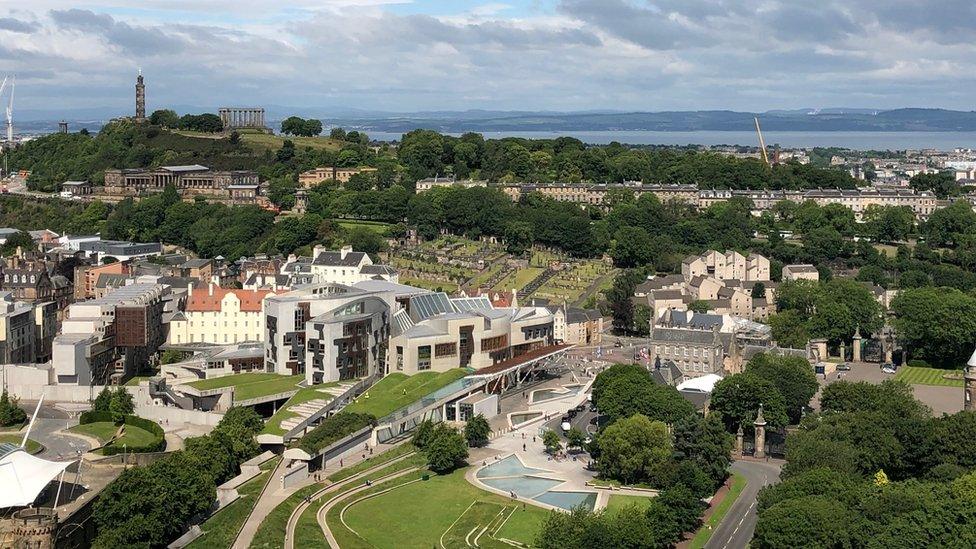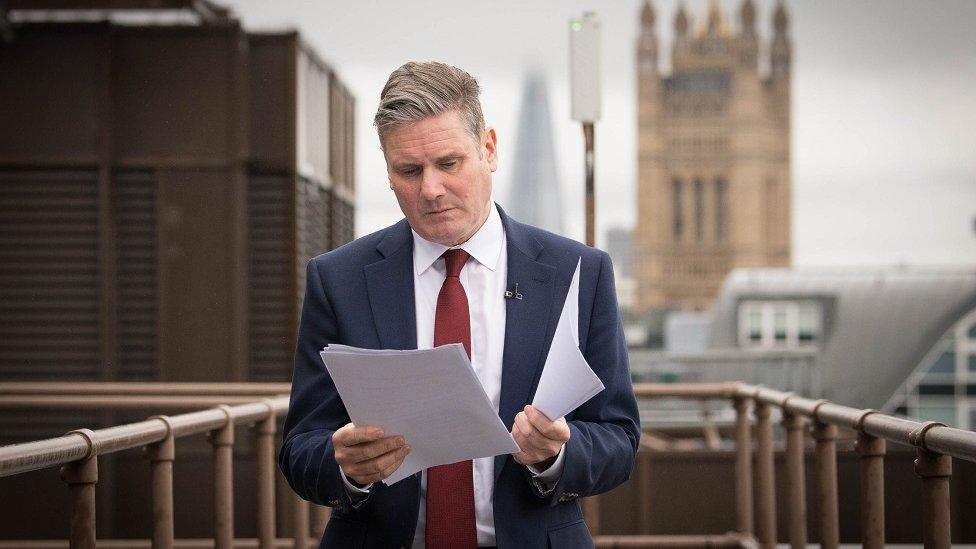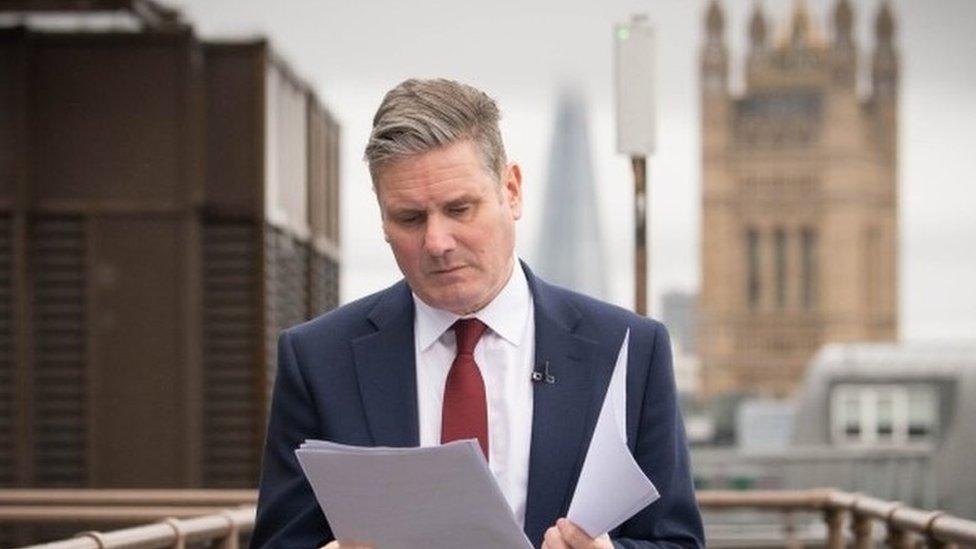Sir Keir Starmer promises to shift power from Westminster
- Published
- comments

Sir Keir Starmer said he was "under no illusion about the scale of the task Labour faces" in Scotland
Labour leader Sir Keir Starmer has committed his party to delivering the "boldest devolution project in a generation" in a policy speech.
He is to set up a constitutional commission to offer a "positive alternative to the Scottish people".
Sir Keir said leaders had a "shared duty" to "rebuild together" across the UK in the wake of the Covid-19 crisis.
But First Minister Nicola Sturgeon has argued that independence is "essential" to rebuilding Scotland post-pandemic.
The SNP have dismissed the plans as "constitutional tinkering" while the Scottish Conservatives said Labour were offering nothing new to challenge the SNP's dominance of Scottish politics.
Sir Keir used his speech on Monday - delivered online due to physical distancing - to confirm the setting up of a UK-wide constitutional commission, advised by former prime minister Gordon Brown, to deliver a "fresh and tangible offer" to the Scottish people.
He said the pandemic had put "rocket boosters" under the case for decentralisation of power, saying his party must "grasp the nettle and offer real devolution of power and resources" if it is to have any hope of preserving the future of the union.
He said: "It is Labour's duty to offer a positive alternative to the Scottish people. To show that you don't have to choose between a broken status quo and the uncertainty and divisiveness of separatism.
"Boris Johnson isn't Britain, just as Nicola Sturgeon isn't Scotland.
"The United Kingdom is much more than that, more than any individual. It has been before - and can be again - a great force for social justice, for security and for solidarity."

The independence campaign has regained momentum in the polls following defeat in 2014
With polls suggesting support for independence is on the rise, Sir Keir argued that the shared "history, values and identity" of the people of the UK mean there should be no place for internal borders.
He said Labour's offering must be "every bit as bold and radical" as the devolution delivered in the 1990s, saying the constitutional commission would target "real and lasting political and economic devolution" to local communities in all parts of the UK.
Sir Keir said this was about more than shifting powers from one parliament to another or transferring "a few jobs out of London", adding: "There's a yearning across the United Kingdom for politics and power to be much closer to people."
The project is to start with a listening exercise, with the party looking to "hear from as many people as possible across the UK".
'Wrong priority'
The UK leader said he was "under no illusion about the scale of the task Labour faces" ahead of May's Scottish Parliament election, with Scottish Labour having been in opposition at Holyrood since 2007.
The party has also struggled in other elections north of the border, being reduced to a single Westminster seat in 2019 and finishing fifth in that year's European Parliament elections.
The MP said Labour would argue "passionately" against a new independence referendum saying it was "entirely the wrong priority" to hold a new vote in the teeth of a recession and "when there is such uncertainty about how Brexit and coronavirus will affect us"
He attacked the SNP's record in power, saying: "It's no wonder that Nicola Sturgeon wants to make May's election a referendum on another referendum, because on education, health and social justice the SNP have no story to tell."

The next Holyrood election is due in May 2021, with Labour currently the parliament's third party
The SNP's deputy Westminster leader Kirsten Oswald dismissed Labour's plans, saying the system was "broken" and "not working for Scotland".
"No amount of constitutional tinkering of the kind proposed by Labour will protect Scotland from Brexit or the Tory power grab being imposed upon us against our will," she said.
She said that even Labour supporters doubted their ability to oust the Conservatives from Westminster for another decade at least.
The MP added: "It's clear that only with the full powers of independence will we be able to properly protect our interests and secure our place in Europe - and that decision lies solely with the people of Scotland, not an out-of-touch Westminster system."
The Scottish Conservatives insisted they were the only party capable of taking on the SNP and championing the union.
Scottish Tory leader Douglas Ross said: "This isn't leadership from Labour on the union, this is the same old tired argument that they've made before and they're offering nothing to challenge the SNP.
"Scottish Labour won't work with unionist parties to stop the nationalists, and they won't stand up to Nicola Sturgeon's demand for another independence referendum as early as next year.
"Only the Scottish Conservatives have the strength to take on the SNP right across Scotland and the determination to stop their push for indyref2 again."
The Scottish Liberal Democrats, however, said they are willing to work with Labour on a "third way" forward.
Leader Willie Rennie said: "Liberal Democrats support a new federalist settlement that means we can find a better way to agree a common future across the United Kingdom."
Can Keir Starmer save the United Kingdom?
By Nick Eardley, BBC political correspondent

Devolution is pretty straightforward when national and devolved leaders agree. When they don't, it becomes a lot harder.
Nowhere has that been more obvious than in Scotland - and his speech was Sir Keir's first major foray into the independence debate.
For years, many believe Labour in Scotland has been in a constitutional no man's land; stuck between the pro-independence SNP and the strongly unionist Conservatives.
Labour has flirted with different positions - and has taken a hammering at the polls as a result.
Today's speech was intended to give more clarity on exactly where Sir Keir stands ahead of May's Holyrood election. He has adopted a similar position to the UK government on calls for another independence vote; not now, but not quite ruling it out forever.
Labour is open to more powers for Holyrood, presents itself as the party which introduced devolution in the first place, and will oppose what it sees as attacks on devolution from the current UK government.
Related topics
- Published21 December 2020

- Published24 October 2020
